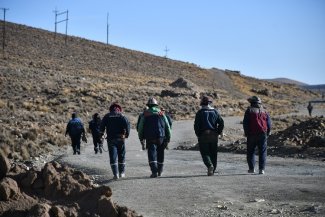A carer from the Senda de Cuidados (Care Footpath) association takes an elderly woman out shopping.
Imagine having to work almost 12 hours a day, seven days a week, with no breaks, no holidays, no contract and no rights. This was how Aleida lived for 12 years. “I worked seven days a week. Going for the shopping was my only break.” Sixty-nine year old Aleida is a carer. She lives in Madrid. For many years, she worked as a live-in carer for an elderly woman of over 90 years old. She lived with her silences and tempers, her memory loss and her illnesses. She took on the role of her children, who did not have time to take care of her. All in return for miserable pay and conditions.
The only thing she has kept from her labour is the severe backache she continues to suffer from, due to all the years of strain. “In the end, after all I did for them, they threw me out onto the street. The family told me they were going to put the lady in a home. From one day to the next, I was left with nothing, with no right to anything at all.”
According to the International Labour Organization (ILO), four out of every ten care workers around the world are deprived of the most basic labour rights. In Spain, the proportion is six out of ten, and yet their plight is ignored. Their exploitation has been normalised.
Their work is invisible, undervalued and has a predominantly female face. Almost 90 per cent of the people taking care of the elderly and our dependents are women, and the majority are not even protected by a contract. They rely on verbal agreements with the families, in which they are invariably the weaker party and find themselves working for less than the legally established pay and conditions.
“I couldn’t complain because I was afraid. I had just arrived from Colombia, I didn’t know the Spanish laws, and I didn’t know who to turn to. When you don’t have papers, all you can do is keep your head down.”
As Aleida explains, migrant care workers, many of whom do not have a residence permit, find themselves trapped in an extremely precarious situation. Working without a contract – another illegal practice – makes it all the more difficult for them to regularise their immigration status, leaves them without the right to health care, and forces them to remain within the shadow economy.
Carers, as a result, often speak of ‘luck’ rather than labour rights: the luck of finding a family that treats them well and values their work. The situation in the private care sector is not always much better. Although care companies formalise the employment relationship with the care workers through a contract, they do not always respect the terms set out in it. “Companies also take advantage of us. They pay us poor wages and force us to work more hours than agreed,” says Aleida.
Uniting to fight precarious employment
Care work is often isolated and solitary, especially in the case of live-in carers. Many spend their days as good as locked up in a house that is not theirs, far away from their own families and without a nearby support network. In their case, no one is there to take care of them.
More and more of these women are, however, looking for ways to make themselves more visible, by uniting among themselves. As the International Labour Organization reports, “cooperatives are increasingly providing care across the globe”. Women are coming together, of their own accord, in a bid to protect their rights and to strengthen their position when it comes to negotiating their terms and conditions with the families employing them.
It is not, in fact, a novel solution. Around 100 million people around the world are employed within the framework of a cooperative. In the care sector, however, the development of this model remains slow, and accounts for only one per cent of the total.
In 2015, the ILO published the first global map of care provision through cooperatives. It highlighted that carers who organise themselves in this way are better able to defend their rights, and this has a positive impact on their pay, their conditions and workplace safety.
One of the first to be launched in Spain was Grupo Servicios Sociales Integrados (SSI), based in Bilbao. It was established in 1987 on the (unusual) initiative of the city council itself. Within two years, membership rose from 35 to 250 – all women.
“If the people who do the work are women, then the people who manage the cooperative should also be women,” says the organisation’s CEO, Karmele Acedo.
“The cooperative model has provided us with tremendous scope for empowerment. We all take part in the decision making and we reinvest the profits in ourselves, in our training.” This is one of the other advantages of the cooperative model, and by facilitating its members’ access to training and qualifications, the quality of the care they provide is also enhanced.
Italy offers the best example of such cooperatives. They have been operating there since the 1970s and the root of their success lies in one key factor: the backing they receive from the state. In 1991, the Italian government decided to foster the expansion of these social organisations and provided them with a number of advantages, such as facilitating their access to public contracts, financing or tax breaks.
Care cooperatives are currently spreading from Europe to the United States, from India to Japan, but not all of them benefit from the same conditions found in Italy. Far from it.
Walking a tightrope
The same ILO study that highlights the benefits of cooperatives also underlines their weaknesses. “Among the biggest challenges is insufficient access to financing, the lack of legislation, state support and the lack of experience,” it points out.
The majority of these organisations have neither the funding nor the knowledge required to make a start. And the state does nothing to help.
“Managing an organisation involves a great deal of red tape, and it can be overwhelming,” says Debora Avila, who works as a volunteer for the Spanish care association Senda de Cuidados. This not-for-profit organisation, based in Madrid, operates as an intermediary between families and care workers, to guarantee both decent labour conditions and dignified care. It is a model that could be very successful if it were not, once again, for the lack of economic resources.
“Our structure is not sustainable. We rely on private donations, we are walking a tightrope.
The only solution, they insist, lies with the state. They are calling on it to help families pay for the care of the elderly. A decent wage for a care workers should be between €800 and €1000, but many households cannot afford that amount – in Spain, median household income has fallen by 8 per cent since 2010.
But they are, above all, calling on the government authorities to help associations and cooperatives survive, along the same lines as in Italy. “With more institutional support, initiatives such as these would be viable. For example, many city councils could use the services of associations rather than private companies that do not respect basic labour standards,” insists Avila.
“The real problem is that the value of this work is not yet recognised, and if it is not recognised, it is not paid accordingly.”










